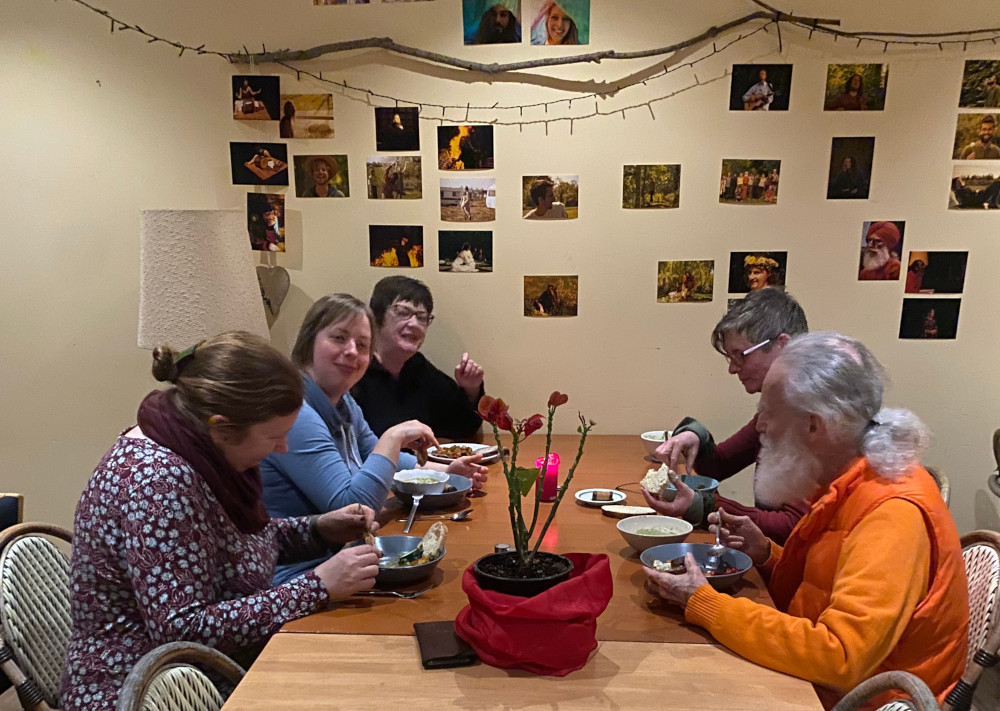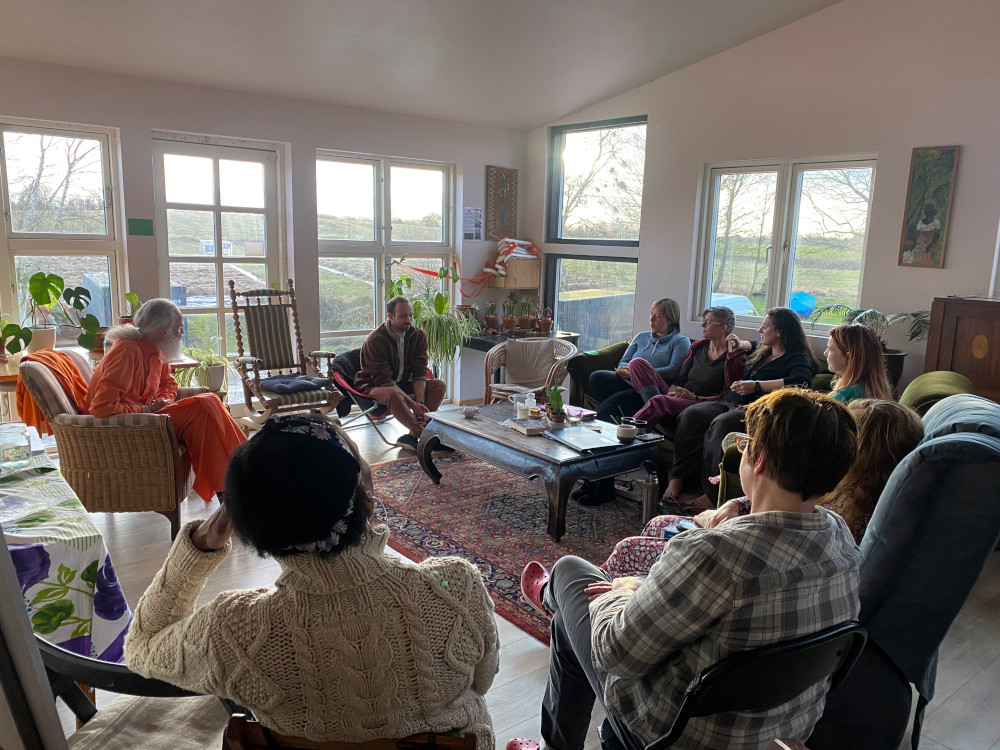On Monday 7th February, we all arrived from our various corners of northern Europe: Ireland, Germany and Sweden to Ananda Gaorii Ashram and organic farm located just outside Vig, a small rural town in Denmark about an hour from Copenhagen.
Those of us who have never been before (myself included) were eager to learn more about this community and curious to see how it operates: Ananda Gaorii organic farm and ashram is founded on the spiritual practice of yoga, meditation and community service as paths to reaching self realisation. This gives the centre a specific character and feeling as soon as one enters. The sense of being welcomed to a ‘family’ is evident in small as well as larger things: Women are referred to as Sisters, men as Brothers. Spiritual artworks and reflective sayings adorn the walls, notices are handwritten and there is a sense of respect for others’ space and a feeling of contentment and calm, perhaps magnified by the fact that fewer short term Volunteers were on site than usual. The friendliness of the monks and residents and their generous interest in the newcomers was spontaneous and genuine.
Eco awareness is reinforced by notices in the bathrooms and elsewhere reminding one to be mindful of the use of resources i.e. water and toilet paper. The community’s diet was explained to us in the welcome pack, as was the daily meditation routine.

For most of us the vegan diet wasn’t too challenging and the real challenge was in trying to avoid the delicious bread, cakes and pastries provided by the onsite bakery! The lovely baker and others made delicious treats throughout our stay and they were much appreciated and helped fuel the daily work sessions.
Tuesday 8th Feb: Day 1: Introductions were made and we then recapped the project’s outline and objectives, for the benefit of the old hands as well as newcomers, and collected the topics we wished to tackle and explore over the 4 days’ work sessions.
In the afternoon we had the tour of the Ananda Gaorii centre, also the organic farm and the work buildings and afterwards had time for an ‘introduction to meditation’ workshop with Dada Krshnasavnanenda.
We ended the day on an exchange of topics of interest to us; we drew up and agreed on a list of main topics to be further explored and also discussed the fact that we wanted some practical progress to be made on the dissemination of the learning from our best practice exchanges, which ideally should be well under way at this stage.
Weds, Day 2:
Ulrike Schimmel joined us online in the morning from Sieben Linden ecovillage to encourage us through the necessary but unexciting task of clarifying the budget and administrative aspects of the project.
We followed that with an update from each centre on any new practices we had taken from our partners and implemented in our own work. For the newcomers to the project, this was informative in terms of current working practices and the new Angsbacka participants were happy to hear how aspects of their ESC Volunteer processes had fed into Irish and Danish practice such as: holding sharing circles and conducting empowering workshops for Volunteers on boundaries and consent, plus fortnightly one on one mentor meetings.
All of us had something to share on exchanges of best practice adopted from a partner organisation, from adding context and cultural info to our welcome packs along with the essential practical info, to ensuring that complaints procedures were conducted by a panel rather than one individual to ensure objectivity and fair processes.
That afternoon we exchanged more information on our agreed topics and started to create a document comprising a selection of the best of our shared good practice from those outlined by each of our centres, shared practices which we had agreed were universal to us all and that we would be happy to recommend to other organisations as tried and proven to work. Aaron and Mel joined us virtually from Cloughjordan and added their perspective to a fruitful and productive session. We added to this document throughout the afternoon and early evening and in this way co produced the Best Practice Document.
Thurs, Day 3: We recommenced adding to our output documents, including the Best Practice document. We then continued to steadily make our way down through the agreed list of discussion topics.
We had a fun exploratory tour to the surrounding area in the afternoon to visit some of the regional cultural sites and scenic viewing points….we donned hats, scarves and big coats against the formidable wind and set off with a box of delicious, specially baked goods stored safely in our tour van. We returned refreshed and enthused by our trip to finish work on our documents for a couple of hours before retiring for the evening.
Friday, Day 4: Final Day: This was task allocation day, focusing on the completion and dissemination of our learning outputs and we identified which groups and individuals would produce which aspects of each element and theme.

In the afternoon we had the opportunity to meet some current and ex-Volunteers and residents from Ananda Gaorii. Their personal stories and experiences, what initially brought them to Ananda Gaorii and what they have contributed to the community since, made for riveting listening.
We then got on with completing our list of chosen topics but acknowledged there were still some loose ends which should get resolved and ‘tied off’ at our final partner meeting in Cloughjordan in April. We outlined next steps and referred to the necessary upcoming final evaluation of this small scale partner project, which we all acknowledged has been very beneficial to each of us in terms of knowledge exchange, but also in terms of collegial solidarity and mutual support during a very difficult pandemic period, and the resulting insecurity of our collective ongoing work. We are happy to be now producing practical outcomes from this much delayed and repeatedly extended project which has finally happened in much the way we had originally hoped, and which has, in our view, been well worth the wait and the effort.
Among the less tangible but no less powerful benefits of participating in training and exchange of practices in places that differ highly from one’s own, is the learning that comes with that exposure to both cultural and infrastructural contrasts. In this case I was fascinated by a sustainable community which has at its core the very thing that is absolutely missing from my own secular ecovillage- community ritual and spiritual practice. And yet in terms of governance, oversight and decision making we all face similar challenges and problems, as well as creative insights on how to find solutions to the same: it seems that the more we apparently differ on the surface, the more we find that we are fundamentally the same.
Written by Eileen Brannigan (Cloughjordan)